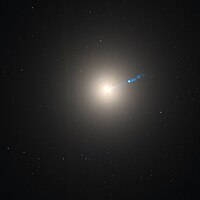
Photo from wikipedia
The scatting probability of scalar particles near the event horizon is obtained by solving Klein-Gordon equation in curved space-time. By considering the reaction of a black hole radiation in space-time… Click to show full abstract
The scatting probability of scalar particles near the event horizon is obtained by solving Klein-Gordon equation in curved space-time. By considering the reaction of a black hole radiation in space-time background, we find that Hawking radiation is not a strictly pure thermal-spectrum and scatting probability is related to the B-H entropy change of black hole. The statistical entropy of black hole is calculated based on the relations between entropy and thermodynamic probability of a macroscopic state in statistical equilibrium. The results show that the statistical entropy of black hole without using any truncation factor is proportional to the area of event horizon.
Journal Title: International Journal of Theoretical Physics
Year Published: 2017
Link to full text (if available)
Share on Social Media: Sign Up to like & get
recommendations!